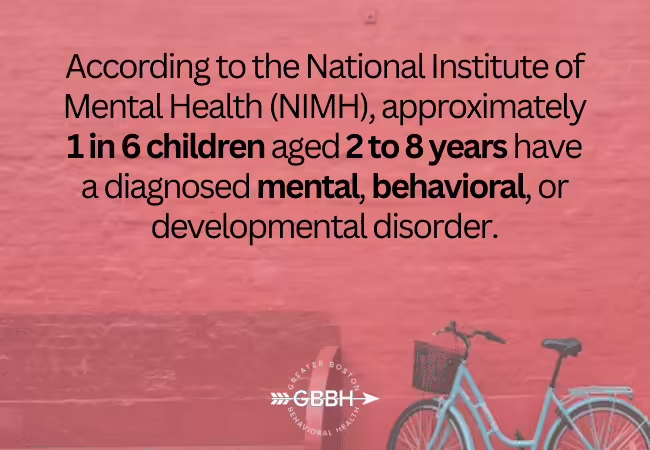Children’s mental health is just as important as their physical health, yet it is often overlooked until significant issues arise. Mental health services for children provide critical support to help them navigate the challenges of growing up, such as adjusting to school, coping with family changes, managing peer relationships, and dealing with emotional struggles. Early intervention can prevent more severe mental health conditions later in life and ensure that children have the emotional tools they need to succeed.
The Need for Children’s Mental Health Services
Childhood and adolescence are formative years that involve tremendous physical, emotional, and cognitive development. These years also provide the groundwork for skills and behaviors that will bear a lifetime.
However, children’s mental health issues are frequently disregarded. Every year, around one in every six children aged 6 to 17 in the United States develops a mental health issue. Anxiety, depression, and ADHD are becoming more common, and they can influence a child’s capacity to function in daily life, including their academic performance, social interactions, and even physical health.
Why Mental Health Services Are Vital for Children
Children go through numerous developmental stages that can be difficult to navigate. From learning how to express emotions to managing school pressures, these transitions can sometimes lead to emotional difficulties. Mental health services play a crucial role in helping children develop healthy coping mechanisms, improving their ability to manage stress, and teaching them how to regulate their emotions effectively.
- Building Emotional Resilience
Children who receive mental health support can develop resilience and coping strategies that will help them manage life’s stressors more effectively. Programs like CBT Therapy Boston and DBT Therapy Boston can provide children with practical tools for handling anxiety, depression, and behavioral issues. - Addressing Early Signs of Mental Health Issues
Early identification of mental health concerns can prevent more serious conditions from developing. For instance, untreated anxiety, depression, or anger management issues in children can evolve into chronic problems in adulthood. Providing early access to mental health programs can reduce the risk of such developments and help children thrive emotionally. - Improving Academic and Social Success
Children who struggle with mental health issues may have difficulties in school, such as concentration problems, social withdrawal, or behavioral outbursts. Addressing mental health needs through Behavioral health in Boston can significantly improve a child’s academic performance and help them build positive relationships with peers and teachers.
Addressing Early Mental Health Issues
Early intervention can make a significant difference in the lives of children coping with mental health issues. According to studies, children who receive mental health help at a young age are more likely to overcome or manage their problems as adults. Mental health treatments for children provide specialized, age-appropriate interventions that address their specific developmental needs.
When children receive early support, they develop healthy coping strategies and skills for managing their emotions, communicating effectively, and dealing with stressful situations. This helps to avoid more serious challenges later in life, such as substance abuse, academic failure, and even chronic mental illness.
The Important Role of Schools in Mental Health Issues
Schools are one of the most essential settings for children to receive mental health assistance. Because children spend so much time at school, mental health issues are frequently discovered there first. School-based mental health services provide crucial assistance by delivering therapy, raising awareness, and even incorporating families.
Teachers and school counselors can help spot early indicators of mental health disorders and send students to appropriate services. Many schools are now establishing mental health programs to assist students manage stress, developing resilience, and enhancing social skills, which can help prevent problems from rising.
Common Mental Health Challenges in Children
Children can face a variety of mental health challenges, many of which may be linked to emotional, behavioral, or cognitive difficulties. Common issues include:
- Anxiety and Depression
Anxiety and depression are common mental health concerns for children, often triggered by changes in their environment, school pressures, or family dynamics. Cognitive Behavioral Therapy (CBT) has proven to be effective in helping children recognize and address negative thought patterns, reducing symptoms of anxiety and depression. - Behavioral Issues and Anger Management
Children with behavioral health challenges may struggle with anger, impulse control, or acting out. Anger management in recovery programs can be vital in teaching children to manage their emotions and develop better ways to express their feelings. - Trauma and Stress
Experiencing trauma or stress from abuse, neglect, or family disruption can have long-lasting effects on a child’s mental health. Trauma therapy programs can help children process these difficult experiences and begin to heal.
How Mental Health Services Benefit Children
Providing children with access to mental health services offers long-term benefits that can set them on a healthier path. Here are a few ways mental health services can help:
- Developing Healthy Coping Mechanisms
Children who attend Mental Health Programs in Boston learn effective coping skills that they can use throughout their lives. These strategies help them manage stress, communicate effectively, and address challenges in a healthy way. - Support for Families
Mental health treatment for children often involves family therapy to ensure that the child’s support system is involved in their recovery. Family therapy programs teach parents and caregivers how to create a nurturing environment at home and support their child’s mental health needs. - Promoting Long-Term Mental Health
By addressing mental health concerns early, children are less likely to experience severe mental health challenges as adults. Long-term engagement in mental health treatment centers in Boston helps children develop the emotional tools they need for lasting success.
Types of Mental Health Services for Children
Children’s mental health services are frequently provided in several formats to better address each child’s specific requirements. Several of these services include:
- Individual Therapy: In one-on-one sessions with a mental health expert, children can discuss personal difficulties and build coping mechanisms.
- Group Therapy: It provides children with a safe environment in which to communicate with classmates who may be facing similar issues, allowing them to feel less isolated.
- Family therapy: This engages family members in the process of improving communication, strengthening relationships, and creating a supportive environment at home.
- School-based programs: These frequently include counselors, peer groups, and other mental health resources on-site.
These mental health programs assist children in managing their emotions, reducing stress, and developing a greater sense of self-esteem. Access to these resources makes a significant impact in helping youngsters overcome or manage mental health concerns.
When to Seek Professional Help for a Child
As a parent or caregiver, it’s important to know when to seek professional help for your child. Signs that a child may need mental health support include:
- Behavioral Changes
Sudden changes in behavior, such as increased irritability, withdrawal from social activities, or a decline in academic performance, can be indicative of underlying mental health issues. - Extreme Emotions
Intense feelings of sadness, anxiety, or anger that persist for weeks or months may require professional intervention. - Difficulty Coping with Life Changes
Children who struggle with coping after significant life changes, such as a divorce, the death of a loved one, or a move to a new home, can benefit from mental health services.
Finding the Right Mental Health Support? Call GBBH!
When it comes to your child’s mental health, finding the right support is essential. At GBBH, we understand the importance of addressing mental health concerns early and providing comprehensive care tailored to each child’s unique needs. Our team of experienced therapists and mental health professionals are here to guide your child through their mental health journey, ensuring they receive the highest quality care in a supportive environment.
How GBBH Can Help Your Child
- Individual Therapy: Our therapists work one-on-one with your child to address their mental health challenges, using techniques like CBT and DBT to help them process emotions and build resilience.
- Group Therapy: Group therapy provides a supportive environment for children to connect with others who may be going through similar experiences, fostering a sense of community and shared understanding.
- Family Therapy: We involve the family in the treatment process, helping parents understand their child’s struggles and teaching them effective ways to support their child’s growth and healing.
Conclusion
The importance of mental health services for children cannot be overstated. Early intervention can provide children with the tools they need to lead fulfilling, productive lives. Programs like CBT Therapy Boston and DBT Therapy Boston offer targeted support for children dealing with mental health challenges, empowering them to cope, thrive, and grow emotionally. If you believe your child may benefit from professional help, contact a Mental Health Treatment Center in Boston today to learn more about the available services and programs. Take the first step today and reach out to us at (888)278-0716 and invest in your mental wellness –you deserve it.
FAQ on Importance of Mental Health Services for Children
Why is mental health support important for children?
Mental health support is essential for children as it helps them develop emotional resilience, improve their social and academic skills, and manage stress and anxiety. Early intervention can prevent long-term mental health issues and set a child on a path to a healthier, happier life.
What are the most common mental health issues in children?
Common mental health issues in children include anxiety, depression, ADHD, behavioral problems, trauma-related disorders, and difficulties with anger management. Identifying and treating these issues early is crucial to fostering a child’s emotional and psychological well-being.
How can therapy help children with mental health issues?
Therapy, such as Cognitive Behavioral Therapy (CBT) and Dialectical Behavior Therapy (DBT), can help children learn to cope with their emotions, develop problem-solving skills, and improve their behavior. Therapy also offers children a safe space to express themselves and work through difficult feelings.
What types of therapy are available for children at Greater Boston Behavioral Health?
At Greater Boston Behavioral Health, we offer a range of therapies including CBT, DBT, anger management therapy, trauma therapy, and family therapy. These therapies are designed to meet the unique needs of each child and support them in managing their emotions and behavior effectively.
When should I seek professional help for my child’s mental health?
If your child is showing signs of anxiety, depression, difficulty managing emotions, or social isolation, it’s important to seek professional help. Early intervention is key to preventing these issues from escalating and to providing your child with the tools they need to succeed.


